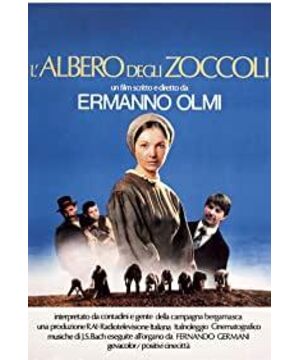A Palme d'Or recipient for Italian filmmaker Ermanno Olmi for his humanist depiction of the agrarian life in Bergamo, Lombardy, near the turn of the 20th century, THE TREE OF WOODEN CLOGS, is a 3-hour essayistic pastoral only betrays its political agency in the downbeat coda. Four households living in a farmhouse and their quotidian tenor of lives are peeped through Olmi's perceptive but dispassionate lens, a pseudo-documentary employing non-actors to uphold the performance as natural as possible (resultantly, reduction of expression is its knock-on effect), perfectly re-enacts a verisimilitude of reality regarding his parents' generation concretely imprinted in Olmi's mind. The families are all sharecroppers and don't own an inch of the land where they are toiling, and receive meager income from the landlord predicated on the productivity.To today's eyes, the film's nostalgic atmosphere (copiously purveyed by organistFernando Germani's lyrical rendering of Bach's oeuvre), authentic loci and primitive means of life are quite at a remove, but what matters the most (and strikes home) is Olmi's unqualified benevolence towards his subjects, his utmost reverence to humanity flickering through the successive occurrences at once trivial and vital, temporal and sacred, a high note arrives in the pig-butchering sequence where that poor critter's wail reverberates in viewer's head long after its life force is severed, we are forced to see something unsavory on which we are all inclined to turn a blind eye. Piety, is ensconced in the forefront here, the film opens with a scene in church,where a priest persuades an illiterate peasant that his son is smart enough to go to a proper school (at a time when basic education is still a privilege); a widow with six children is granted with a "miracle" when her livestock is given a death warrant from the vet; a pair of newlyweds gets married in the church on an early morning, visits a convent later and brings back to home a foundling, this segment dislocates us from the parochial milieu and offers a glance of a bigger picture ( commotion and conflicts are hinted), however transient it is. But conspicuously the film has less ambition in highlighting human follies, a country fair is presented, an episode of an inane farmer hiding a golden coin inside a horse's hoof is the closest thing we can get.a widow with six children is granted with a "miracle" when her livestock is given a death warrant from the vet; a pair of newlyweds gets married in the church on an early morning, visits a convent later and brings back to home a foundling, this segment temporarily dislocates us from the parochial milieu and offers a glance of a bigger picture (commotion and conflicts are hinted), however transient it is. But conspicuously the film has less ambition in highlighting human follies, a country fair is presented, an episode of an inane farmer hiding a golden coin inside a horse's hoof is the closest thing we can get.a widow with six children is granted with a "miracle" when her livestock is given a death warrant from the vet; a pair of newlyweds gets married in the church on an early morning, visits a convent later and brings back to home a foundling, this segment temporarily dislocates us from the parochial milieu and offers a glance of a bigger picture (commotion and conflicts are hinted), however transient it is. But conspicuously the film has less ambition in highlighting human follies, a country fair is presented, an episode of an inane farmer hiding a golden coin inside a horse's hoof is the closest thing we can get.this segment temporarily dislocates us from the parochial milieu and offers a glance of a bigger picture (commotion and conflicts are hinted), however transient it is. But conspicuously the film has less ambition in highlighting human follies, a country fair is presented, an episode of an inane farmer hiding a golden coin inside a horse's hoof is the closest thing we can get.this segment temporarily dislocates us from the parochial milieu and offers a glance of a bigger picture (commotion and conflicts are hinted), however transient it is. But conspicuously the film has less ambition in highlighting human follies, a country fair is presented, an episode of an inane farmer hiding a golden coin inside a horse's hoof is the closest thing we can get.
A revered ethnographic infotainment permeated with bucolic sublimity, THE TREE OF WOODEN CLOGS-its title referring to the occasion of the harsh punishment received by one of the households in the end, has its own incontrovertible artistic integrity and a rarefied stature matched by few peers, but there is a smattering of monotony and inflexibility is extruded out of its unyielding aesthetic tenet, which may have done a disservice to itself, not least considering its epic length. referential point: Vojtech Jasný's ALL MY COMPATRIOTS (1969, 7.9/10)
View more about The Tree of Wooden Clogs reviews







